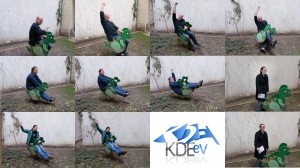Ah, the Powder Blues band. Apologies, mostly.
I know a place on the wrong side of town,
Where the band width is cookin and they’re loading on down,
Joe compiles like his souls on fire,
Baking a new firmware for a telephone wire,
Rev up the sources, compliance comes down,
Doin it right on the wrong side of town!
In these troubled times, I thought I’d share some tales of companies doing it (relatively) right. Thanks to the quiet pressure and diplomacy of gpl-violations.org and their (and FSFE, too) desire to work on dialogue and long-term solutions, it’s possible to find consumer electronics in Europe that are compliant (within the wriggle room that is left in the notion of “compliance”).
In September I picked up a Lacie Network Space drive. 1TB, I think, UPnP server, black, glossy. So of course the first thing I did was go looking for GPL violations. This ended up with a half dozen folks standing around a table, red wine in hand, an improvised network on the floor. The manual of the product doesn’t mention the GPL. If you boot it up, you can get the syslog:
Jan 1 00:00:28 syslogd started: BusyBox v1.1.0 (2006.11.03-14:53+0000)
Jan 1 00:00:29 kernel: klogd started: BusyBox v1.1.0 (2006.11.03-14:53+0000)
Jan 1 00:00:29 kernel: Linux version 2.6.12.6-arm1 (jrichefeu@grp-horus) (gcc version 3.4.4 (release) (CodeSourcery ARM 2005q3-2)) #3 Tue Feb 3 14:04:45 CET 2009
Jan 1 00:00:29 kernel: CPU: ARM926EJ-Sid(wb) [41069260] revision 0 (ARMv5TEJ)
I should add it’s really quiet a nice piece of kit, except it never spins the disk down. And of course, the manual doesn’t mention the GPL. But the support section of the website does, and it’s not difficult to find the source downloads section. I haven’t verified that these are the complete and corresponding sources. It looks reasonable, though.
More recently I bought a Conceptronic Media Giant Plus, which is a HDD plus codecs and a bunch of A/V plugs, so it goes right into the TV — and then videos and whatnot go on the HDD, and play from there. The UI is a little clunky, but it works well enough, and if it saves having to go through and find the right DVD for the kids all the time, that’s fine by me. I don’t know what the hardware inside is exactly; it’s been on only once so far to copy the Eefje Wentelteefje TV Show onto it.
The box comes with a thin leaflet of license compliance statements. “Great!” I thought, but it turns out to be MPEG-4 compliance, and Fraunhofer, and all kinds of commercial licenses, patent licenses, consortium licenses, etc. No mention of the GPL. No mention of the software actually running on the machine. “Drat!” thought I. I don’t rub my hands together and cackle evilly then, though.
So my surprise was a little greater when I leafed through the (thick and comprehensive) user manual and found, at the back, a chapter “Licensing Information”.
This Conceptronic product (Media Giant) includes copyrighted third-party software licensed under the terms of the GNU General Public License. .. the following parts of this product are subject to the GNU GPL: (list including busybox, xine, Linux kernel). … Conceptronic as eposed (sic – exposed?) the full source code of the GPL licensed software, including any scripts to control compilation and installation of the object code. All future firmware updates will also be accompanied with their respective source code. For more information on how you can obtain our open source code, please visit our web site.
That text is followed by the full text of the GPL version 2, the LGPL version 2.1 and the FreeType license, 2006-Jan-27.
So, that’s pretty thorough except that a “visit our website” isn’t all that specific. I couldn’t find any links to the source on the product page, but some searching turned up the source at last.
So here’s two cases of “yeah, that’s ok, could be better, keep trying” — it’s like dealing with my son learning to ride a bicycle, they need some encouragement and support, because they’re still learning.


